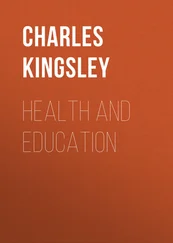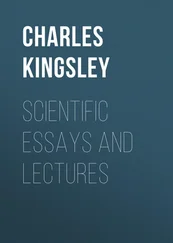Charles Kingsley - Alexandria and Her Schools
Здесь есть возможность читать онлайн «Charles Kingsley - Alexandria and Her Schools» — ознакомительный отрывок электронной книги совершенно бесплатно, а после прочтения отрывка купить полную версию. В некоторых случаях можно слушать аудио, скачать через торрент в формате fb2 и присутствует краткое содержание. Жанр: foreign_antique, Философия, foreign_edu, на английском языке. Описание произведения, (предисловие) а так же отзывы посетителей доступны на портале библиотеки ЛибКат.
- Название:Alexandria and Her Schools
- Автор:
- Жанр:
- Год:неизвестен
- ISBN:нет данных
- Рейтинг книги:5 / 5. Голосов: 1
-
Избранное:Добавить в избранное
- Отзывы:
-
Ваша оценка:
- 100
- 1
- 2
- 3
- 4
- 5
Alexandria and Her Schools: краткое содержание, описание и аннотация
Предлагаем к чтению аннотацию, описание, краткое содержание или предисловие (зависит от того, что написал сам автор книги «Alexandria and Her Schools»). Если вы не нашли необходимую информацию о книге — напишите в комментариях, мы постараемся отыскать её.
Alexandria and Her Schools — читать онлайн ознакомительный отрывок
Ниже представлен текст книги, разбитый по страницам. Система сохранения места последней прочитанной страницы, позволяет с удобством читать онлайн бесплатно книгу «Alexandria and Her Schools», без необходимости каждый раз заново искать на чём Вы остановились. Поставьте закладку, и сможете в любой момент перейти на страницу, на которой закончили чтение.
Интервал:
Закладка:
Charles Kingsley
Alexandria and Her Schools / Four Lectures Delivered at the Philosophical Institution, Edinburgh
ALEXANDRIA AND HER SCHOOLS. 1 1 These Lectures were delivered at the Philosophical Institution, Edinburgh, in February, 1854, at the commencement of the Crimean War.
PREFACE
I should not have presumed to choose for any lectures of mine such a subject as that which I have tried to treat in this book. The subject was chosen by the Institution where the lectures were delivered. Still less should I have presumed to print them of my own accord, knowing how fragmentary and crude they are. They were printed at the special request of my audience. Least of all, perhaps, ought I to have presumed to publish them, as I have done, at Cambridge, where any inaccuracy or sciolism (and that such defects exist in these pages, I cannot but fear) would be instantly detected, and severely censured: but nevertheless, it seemed to me that Cambridge was the fittest place in which they could see the light, because to Cambridge I mainly owe what little right method or sound thought may be found in them, or indeed, in anything which I have ever written. In the heyday of youthful greediness and ambition, when the mind, dazzled by the vastness and variety of the universe, must needs know everything, or rather know about everything, at once and on the spot, too many are apt, as I have been in past years, to complain of Cambridge studies as too dry and narrow: but as time teaches the student, year by year, what is really required for an understanding of the objects with which he meets, he begins to find that his University, in as far as he has really received her teaching into himself, has given him, in her criticism, her mathematics, above all, in Plato, something which all the popular knowledge, the lectures and institutions of the day, and even good books themselves, cannot give, a boon more precious than learning; namely, the art of learning. That instead of casting into his lazy lap treasures which he would not have known how to use, she has taught him to mine for them himself; and has by her wise refusal to gratify his intellectual greediness, excited his hunger, only that he may be the stronger to hunt and till for his own subsistence; and thus, the deeper he drinks, in after years, at fountains wisely forbidden to him while he was a Cambridge student, and sees his old companions growing up into sound-headed and sound-hearted practical men, liberal and expansive, and yet with a firm standing-ground for thought and action, he learns to complain less and less of Cambridge studies, and more and more of that conceit and haste of his own, which kept him from reaping the full advantage of her training.
These Lectures, as I have said, are altogether crude and fragmentary—how, indeed, could they be otherwise, dealing with so vast a subject, and so long a period of time? They are meant neither as Essays nor as Orations, but simply as a collection of hints to those who may wish to work out the subject for themselves; and, I trust, as giving some glimpses of a central idea, in the light of which the spiritual history of Alexandria, and perhaps of other countries also, may be seen to have in itself a coherence and organic method.
I was of course compelled, by the circumstances under which these Lectures were delivered, to keep clear of all points which are commonly called “controversial.” I cannot but feel that this was a gain, rather than a loss; because it forced me, if I wished to give any interpretation at all of Alexandrian thought, any Theodicy at all of her fate, to refer to laws which I cannot but believe to be deeper, wider, more truly eternal than the points which cause most of our modern controversies, either theological or political; laws which will, I cannot but believe also, reassert themselves, and have to be reasserted by all wise teachers, very soon indeed, and it may be under most novel embodiments, but without any change in their eternal spirit.
For I may say, I hope, now (what if said ten years ago would have only excited laughter), that I cannot but subscribe to the opinion of the many wise men who believe that Europe, and England as an integral part thereof, is on the eve of a revolution, spiritual and political, as vast and awful as that which took place at the Reformation; and that, beneficial as that revolution will doubtless be to the destinies of mankind in general, it depends upon the wisdom and courage of each nation individually, whether that great deluge shall issue, as the Reformation did, in a fresh outgrowth of European nobleness and strength or usher in, after pitiable confusions and sorrows, a second Byzantine age of stereotyped effeminacy and imbecility. For I have as little sympathy with those who prate so loudly of the progress of the species, and the advent of I know-not-what Cockaigne of universal peace and plenty, as I have with those who believe on the strength of “unfulfilled prophecy,” the downfall of Christianity, and the end of the human race to be at hand. Nevertheless, one may well believe that prophecy will be fulfilled in this great crisis, as it is in every great crisis, although one be unable to conceive by what method of symbolism the drying up of the Euphrates can be twisted to signify the fall of Constantinople: and one can well believe that a day of judgment is at hand, in which for every nation and institution, the wheat will be sifted out and gathered into God’s garner, for the use of future generations, and the chaff burnt up with that fire unquenchable which will try every man’s work, without being of opinion that after a few more years are over, the great majority of the human race will be consigned hopelessly to never-ending torments.
If prophecy be indeed a divine message to man; if it be anything but a cabbala, useless either to the simple-minded or to the logical, intended only for the plaything of a few devout fancies, it must declare the unchangeable laws by which the unchangeable God is governing, and has always governed, the human race; and therefore only by understanding what has happened, can we understand what will happen; only by understanding history, can we understand prophecy; and that not merely by picking out—too often arbitrarily and unfairly—a few names and dates from the records of all the ages, but by trying to discover its organic laws, and the causes which produce in nations, creeds, and systems, health and disease, growth, change, decay and death. If, in one small corner of this vast field, I shall have thrown a single ray of light upon these subjects—if I shall have done anything in these pages towards illustrating the pathology of a single people, I shall believe that I have done better service to the Catholic Faith and the Scriptures, than if I did really “know the times and the seasons, which the Father has kept in His own hand.” For by the former act I may have helped to make some one man more prudent and brave to see and to do what God requires of him; by the latter I could only add to that paralysis of superstitious fear, which is already but too common among us, and but too likely to hinder us from doing our duty manfully against our real foes, whether it be pestilence at home or tyranny abroad.
These last words lead me to another subject, on which I am bound to say a few words. I have, at the end of these Lectures, made some allusion to the present war. To have entered further into political questions would have been improper in the place where those Lectures were delivered: but I cannot refrain from saying here something more on this matter; and that, first, because all political questions have their real root in moral and spiritual ones, and not (as too many fancy) in questions merely relating to the balance of power or commercial economy, and are (the world being under the guidance of a spiritual, and not a physical Being) finally decided on those spiritual grounds, and according to the just laws of the kingdom of God; and, therefore, the future political horoscope of the East depends entirely on the present spiritual state of its inhabitants, and of us who have (and rightly) taken up their cause; in short, on many of those questions on which I have touched in these Lectures: and next, because I feel bound, in justice to myself, to guard against any mistake about my meaning or supposition that I consider the Turkish empire a righteous thing, or one likely to stand much longer on the face of God’s earth.
Читать дальшеИнтервал:
Закладка:
Похожие книги на «Alexandria and Her Schools»
Представляем Вашему вниманию похожие книги на «Alexandria and Her Schools» списком для выбора. Мы отобрали схожую по названию и смыслу литературу в надежде предоставить читателям больше вариантов отыскать новые, интересные, ещё непрочитанные произведения.
Обсуждение, отзывы о книге «Alexandria and Her Schools» и просто собственные мнения читателей. Оставьте ваши комментарии, напишите, что Вы думаете о произведении, его смысле или главных героях. Укажите что конкретно понравилось, а что нет, и почему Вы так считаете.












